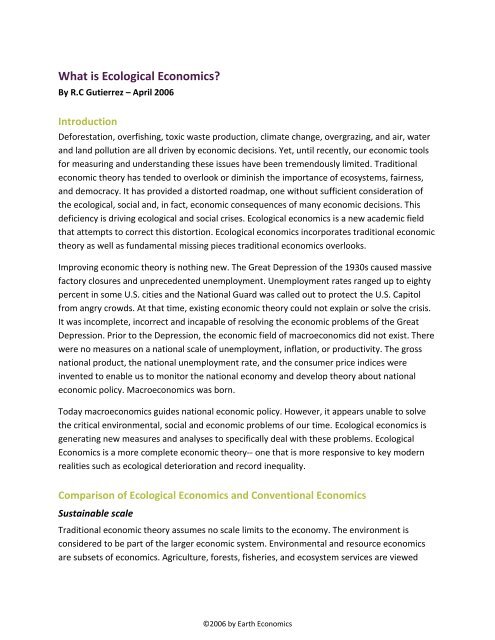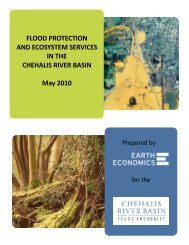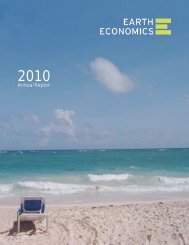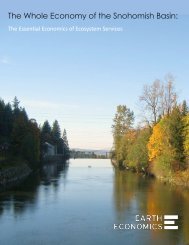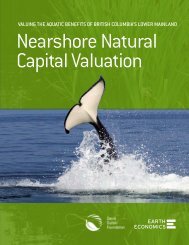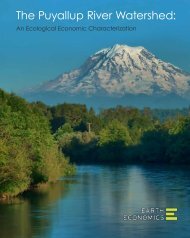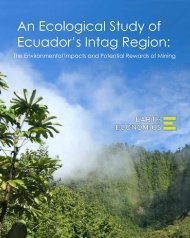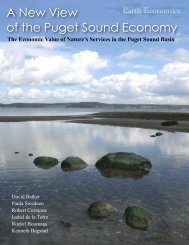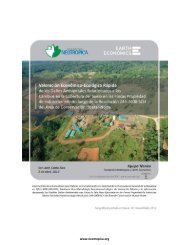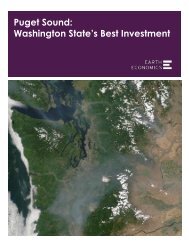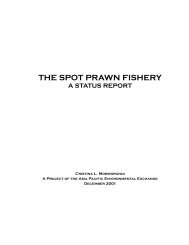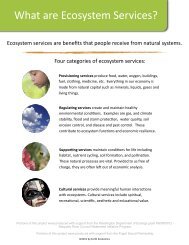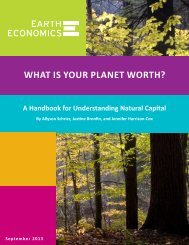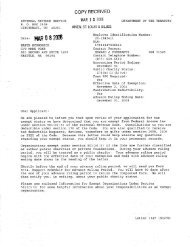What is Ecological Economics? - Earth Economics
What is Ecological Economics? - Earth Economics
What is Ecological Economics? - Earth Economics
Create successful ePaper yourself
Turn your PDF publications into a flip-book with our unique Google optimized e-Paper software.
<strong>What</strong> <strong>is</strong> <strong>Ecological</strong> <strong>Economics</strong><br />
By R.C Gutierrez – April 2006<br />
Introduction<br />
Deforestation, overf<strong>is</strong>hing, toxic waste production, climate change, overgrazing, and air, water<br />
and land pollution are all driven by economic dec<strong>is</strong>ions. Yet, until recently, our economic tools<br />
for measuring and understanding these <strong>is</strong>sues have been tremendously limited. Traditional<br />
economic theory has tended to overlook or dimin<strong>is</strong>h the importance of ecosystems, fairness,<br />
and democracy. It has provided a d<strong>is</strong>torted roadmap, one without sufficient consideration of<br />
the ecological, social and, in fact, economic consequences of many economic dec<strong>is</strong>ions. Th<strong>is</strong><br />
deficiency <strong>is</strong> driving ecological and social cr<strong>is</strong>es. <strong>Ecological</strong> economics <strong>is</strong> a new academic field<br />
that attempts to correct th<strong>is</strong> d<strong>is</strong>tortion. <strong>Ecological</strong> economics incorporates traditional economic<br />
theory as well as fundamental m<strong>is</strong>sing pieces traditional economics overlooks.<br />
Improving economic theory <strong>is</strong> nothing new. The Great Depression of the 1930s caused massive<br />
factory closures and unprecedented unemployment. Unemployment rates ranged up to eighty<br />
percent in some U.S. cities and the National Guard was called out to protect the U.S. Capitol<br />
from angry crowds. At that time, ex<strong>is</strong>ting economic theory could not explain or solve the cr<strong>is</strong><strong>is</strong>.<br />
It was incomplete, incorrect and incapable of resolving the economic problems of the Great<br />
Depression. Prior to the Depression, the economic field of macroeconomics did not ex<strong>is</strong>t. There<br />
were no measures on a national scale of unemployment, inflation, or productivity. The gross<br />
national product, the national unemployment rate, and the consumer price indices were<br />
invented to enable us to monitor the national economy and develop theory about national<br />
economic policy. Macroeconomics was born.<br />
Today macroeconomics guides national economic policy. However, it appears unable to solve<br />
the critical environmental, social and economic problems of our time. <strong>Ecological</strong> economics <strong>is</strong><br />
generating new measures and analyses to specifically deal with these problems. <strong>Ecological</strong><br />
<strong>Economics</strong> <strong>is</strong> a more complete economic theory-- one that <strong>is</strong> more responsive to key modern<br />
realities such as ecological deterioration and record inequality.<br />
Compar<strong>is</strong>on of <strong>Ecological</strong> <strong>Economics</strong> and Conventional <strong>Economics</strong><br />
Sustainable scale<br />
Traditional economic theory assumes no scale limits to the economy. The environment <strong>is</strong><br />
considered to be part of the larger economic system. Environmental and resource economics<br />
are subsets of economics. Agriculture, forests, f<strong>is</strong>heries, and ecosystem services are viewed<br />
©2006 by <strong>Earth</strong> <strong>Economics</strong>
only as subsets of the larger economy. From Econ 101 through a Ph.D. in <strong>Economics</strong>, the<br />
economy <strong>is</strong> never presented or d<strong>is</strong>cussed as a subset of the planet.<br />
<strong>Ecological</strong> economics reverses th<strong>is</strong> view. It points out that resources such as air, water, food,<br />
wood, fiber, minerals, and energy resources are the foundation of the economy and come from<br />
the <strong>Earth</strong>. Sunlight <strong>is</strong> the only critical resource from outside our planet. Our lives and economy<br />
are completely dependent upon and bounded by the ecosystems and materials of th<strong>is</strong> planet.<br />
In the view of ecological econom<strong>is</strong>ts, the actual reality <strong>is</strong> that the economy <strong>is</strong> a subsystem of<br />
earth.<br />
Th<strong>is</strong> relationship leads to concerns about scale never d<strong>is</strong>cussed by traditional econom<strong>is</strong>ts. As<br />
the economy has expanded, consuming more materials, space and energy, th<strong>is</strong> expansion has<br />
reduced ecosystem services and renewable resources (forests, f<strong>is</strong>heries, wetlands) by harming<br />
ecosystems. Th<strong>is</strong> has caused a reduction in available materials (e.g., water, land, mineral and<br />
other shortages), harmed the ability of ecosystems to absorb wastes, and filled even global<br />
atmospheric waste sinks to the point of causing serious negative impacts (e.g., global warming,<br />
rupture of the ozone shield, and increased human exposure to toxics and pollutants).<br />
The result of growing economic activity has been increasing costs in many areas of the<br />
economy, costs which in some cases outweigh the benefits of growth, making some growth<br />
uneconomic. In essence, there are limits to the <strong>Earth</strong>'s capacity to act as a source of material<br />
inputs feeding the economic system and as a sink for the wastes it produces. In order to keep<br />
intact ecological services humanity depends on (including maintenance of the composition of<br />
the atmosphere, climate regulation, flood control, water supply, waste assimilation, recycling of<br />
nutrients, generation of soils, pollination of crops, prov<strong>is</strong>ion of food, and others) and in order to<br />
ensure that the benefits of any growth outweigh its costs, humans need to keep the scale of the<br />
economy within the capacity of the global ecosystem to sustain it.<br />
Because of their recognition of the importance of scale, ecological econom<strong>is</strong>ts stress the<br />
concept of development instead of growth. Where traditional econom<strong>is</strong>ts stress the goal of<br />
increased economic growth in the sense of increased physical movement of energy and matter<br />
through the economy, ecological econom<strong>is</strong>ts tend to stress qualitative improvement -- getting<br />
more production or sat<strong>is</strong>faction out of the same or less material input. An example of the<br />
relationship of these two concepts can be found in comparing a child and an adult. While a<br />
child both grows in the sense of adding body mass, and develops, an adult can develop<br />
tremendously, even after no longer adding body mass.<br />
Fairness and Justice<br />
"D<strong>is</strong>tribution" refers to the div<strong>is</strong>ion of opportunities and resources among different people and<br />
competing uses at a particular point in time and across time. How are opportunities and<br />
©2006 by <strong>Earth</strong> <strong>Economics</strong>
esources divided up among members of the current generation How are they divided<br />
between members of the current generation and future generations How much space <strong>is</strong> kept<br />
in pr<strong>is</strong>tine ecosystems and how much <strong>is</strong> utilized by the economy in ways that make it<br />
permanently unavailable to other species<br />
Traditional economics largely limits d<strong>is</strong>cussion of fairness and d<strong>is</strong>tribution to the way markets<br />
work to d<strong>is</strong>tribute, or "allocate" resources between different end products and consumers. Th<strong>is</strong><br />
<strong>is</strong> why traditional economics can be blind to important categories of social impacts such as<br />
fairness and justice. Human rights, d<strong>is</strong>crimination, and the initial d<strong>is</strong>tribution of rights and<br />
ownership all impact how a market d<strong>is</strong>tributes benefits. The slave trade was highly profitable<br />
for slave producers, traders and consumers. These groups benefited from a market which<br />
literally made a commodity of millions of people. The market may have been "efficient," but the<br />
original granting of ownership rights over people was profoundly unjust. With its focus on<br />
efficiency, traditional economics often <strong>is</strong> ill-equipped to flag even the most egregious violations<br />
of justice and fairness.<br />
Globalization <strong>is</strong>sues provide another example of how traditional economics tends to overlook<br />
<strong>is</strong>sues of justice and d<strong>is</strong>tribution. In Ecuador, shrimp aquaculture operators were granted<br />
tenure rights over coastal areas and local f<strong>is</strong>hermen and women were d<strong>is</strong>located. Wild f<strong>is</strong>heries<br />
production was d<strong>is</strong>placed by shrimp aquaculture. Questions about who <strong>is</strong> granted property<br />
rights such as tenure, and how such rights are granted, are fundamentally important from the<br />
perspective of justice.<br />
Traditional economics, however, would tend to overlook these questions because economic<br />
growth <strong>is</strong> perceived as the solution to d<strong>is</strong>tribution <strong>is</strong>sues. If the size of the economic pie <strong>is</strong><br />
increased, it <strong>is</strong> assumed that everyone will be better off.<br />
<strong>Ecological</strong> econom<strong>is</strong>ts take a different view of justice and fairness questions. In particular, they<br />
believe that difficult questions about the d<strong>is</strong>tribution of resources and opportunities need to be<br />
tackled for the benefit of humanity, society and the economy. Specifically, they believe that<br />
<strong>is</strong>sues of intragenerational, interspecies, and intergenerational equity need to be explicitly<br />
addressed through democratic and transparent, ethically-guided, societal choice.<br />
They reject the assumption that growth solves d<strong>is</strong>tribution <strong>is</strong>sues. For example, they cite<br />
evidence that economic growth in many countries has been accompanied by a widening of the<br />
income gap and that, in some cases, the poorest have become even poorer during periods of<br />
growth. The conversion of the Mexican agriculture sector from small subs<strong>is</strong>tence farmers in the<br />
1980s and 1990s to large export operations increased total income to the sector and resulted in<br />
vast gains by relatively few farmers and bankruptcy and d<strong>is</strong>location and impover<strong>is</strong>hment for a<br />
great number of small farmers. Total income increased and so did poverty. Th<strong>is</strong> failure of<br />
©2006 by <strong>Earth</strong> <strong>Economics</strong>
growth to stem inequity reinforces the ecological economic view that questions about<br />
d<strong>is</strong>tribution have to be addressed more directly through policy and action.<br />
Can we leave it all to the market The ecological economics dec<strong>is</strong>ion hierarchy.<br />
Like traditional econom<strong>is</strong>ts, ecological econom<strong>is</strong>ts believe efficiency <strong>is</strong> important and markets<br />
are essential. Efficiency involves the ratio of the value of output to the value of input. An<br />
efficient allocation <strong>is</strong> an allocation, or div<strong>is</strong>ion, of resources among product end uses according<br />
to individual preferences as weighted by the willingness and ability of individuals to pay. The<br />
mechan<strong>is</strong>m that brings about efficient allocation <strong>is</strong> the market. Most traditional econom<strong>is</strong>ts<br />
focus their attention on the market.<br />
<strong>Ecological</strong> econom<strong>is</strong>ts also believe in the critical importance of markets. However, because<br />
markets do not address <strong>is</strong>sues of scale and fairness, ecological econom<strong>is</strong>ts believe these <strong>is</strong>sues<br />
must be addressed in the rules that govern the market so that the market can achieve not only<br />
an efficient allocation, but one which <strong>is</strong> sustainable and just as well. Once the correct scale,<br />
sustainability, and social rules are in place, if uncertainty <strong>is</strong> small and costs and benefits are<br />
born by market participants, then the market should be allowed to increase efficiency, promote<br />
innovation, allocate resources, and d<strong>is</strong>tribute goods and services efficiently.<br />
A closely related concept <strong>is</strong> that of the triple bottom line. The triple bottom line establ<strong>is</strong>hes<br />
mechan<strong>is</strong>ms that ensure that social and environmental impacts of a dec<strong>is</strong>ion are accounted for<br />
along with efficiency and financial returns.<br />
Dec<strong>is</strong>ion-making in the face of high stakes uncertainty<br />
Traditional econom<strong>is</strong>ts tend to minimize uncertainty. They also tend to argue that technology<br />
will be able to address any collapse in ecological systems.<br />
Most ecological econom<strong>is</strong>ts believe, in contrast, that it <strong>is</strong> irresponsible to bet the future of<br />
humanity on uncertain technological developments. They believe that in the case of complex<br />
systems like the <strong>Earth</strong>'s biophysical cycles and ecosystems, where some dec<strong>is</strong>ions are<br />
irreversible and uncertainty <strong>is</strong> high, a precautionary approach <strong>is</strong> best, economically,<br />
environmentally and socially. In the face of high stakes uncertainty, they believe we should take<br />
steps to reduce uncertainty, encourage but not bank on technological development, and<br />
develop mechan<strong>is</strong>ms to safeguard against potentially catastrophic effects.<br />
©2006 by <strong>Earth</strong> <strong>Economics</strong>


